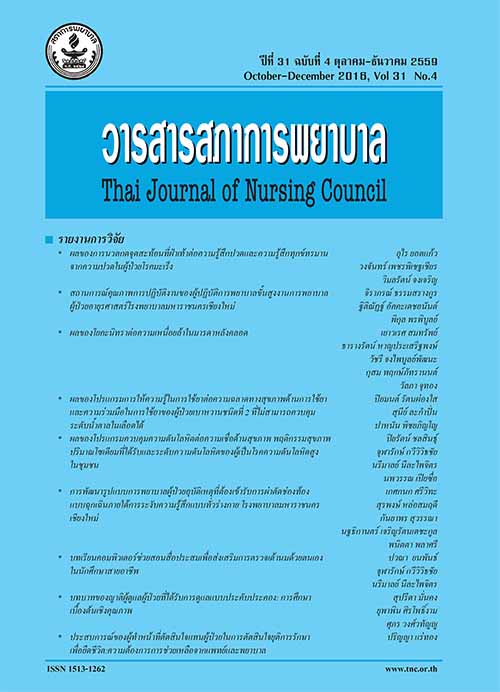ผลของโยคะนิทราต่อความเหนื่อยล้าในมารดาหลังคลอด; Impact of Yoga Nidra Practice on Postpartum Women’s Fatigue
Keywords:
โยคะนิทรา, ความเหนื่อยล้า, มารดาหลังคลอด, 24 ชั่วโมงหลังคลอด, Yoga Nidra, fatigue, postpartum women, 24 hours after parturitionAbstract
บทคัดย่อ: วัตถุประสงค์ของการวิจัย: เพื่อ (1) เปรียบเทียบระดับความเหนื่อยล้าของมารดาหลังคลอด ระหว่างก่อนและหลังปฏิบัติโยคะนิทรา และ (2) เปรียบเทียบระดับความเหนื่อยล้าของมารดาหลังคลอด ระหว่างกลุ่มที่ปฏิบัติโยคะนิทรากับกลุ่มที่ได้รับการพยาบาลตามปกติ
การออกแบบวิจัย: กำรวิจัยกึ่งทดลองแบบ 2 กลุ่ม วัดก่อนและหลังกำรทดลอง
วิธีดำเนินการวิจัย: กลุ่มตัวอย่างเป็นมารดาหลังคลอดในโรงพยาบาลมหาวิทยาลัยแห่งหนึ่งในภาคใต้จำนวน 124 ราย แบ่งเป็นกลุ่มทดลองและกลุ่มควบคุม กลุ่มละ 62 ราย เก็บข้อมูลระหว่างเดือนตุลาคม 2557 ถึงเดือนมกราคม 2558 กลุ่มทดลองจะได้รับการปฏิบัติโยคะนิทราเป็นเวลา 20 นาทีในระยะ 2 ชั่วโมงแรกหลังคลอด ส่วนกลุ่มควบคุมได้รับการพยาบาลตามปกติ เครื่องมือวิจัย ได้แก่ (1) แบบบันทึกข้อมูลส่วนบุคคล และข้อมูลทำงสูติศาสตร์(2) เสียงบันทึกและคู่มือกำรปฏิบัติโยคะนิทรา ที่ผ่านการตรวจความตรงทางเนื้อหา และ (3)แบบสอบถามความเหนื่อยล้ำ มีค่าสัมประสิทธิ์ความเที่ยงของครอนบัค 0.91 วิเคราะห์ข้อมูลโดยใช้สถิติการแจกแจงความถี่ ร้อยละ ค่ำเฉลี่ย ค่ำเบี่ยงเบนมาตรฐาน ไคว์สแควร์ ค่าทีคู่ และค่าทีอิสระ
ผลการวิจัย: พบว่ามารดาหลังคลอดกลุ่มที่ปฏิบัติโยคะนิทรา มีความเหนื่อยล้าหลังคลอด น้อยกว่ากลุ่มที่ไม่ได้ปฏิบัติโยคะนิทราอย่างมีนัยสำคัญทางสถิติ (t = 18.67, p < 0.001). และมารดาหลังคลอดกลุ่มที่ปฏิบัติโยคะนิทรามีความเหนื่อยล้าหลังปฏิบัติน้อยกว่าก่อนปฏิบัติ
(t = 6.94, p < 0.001)ซึ่งผลวิจัยครั้งนี้สะท้อนว่าการปฏิบัติโยคะนิทราช่วง 2 ชั่วโมงแรกหลังคลอด ช่วยลดความเหนื่อยล้าในมารดาหลังคลอดได้
ข้อเสนอแนะ: ควรส่งเสริมมารดาหลังคลอดปกติทุกรายปฏิบัติโยคะนิทรา เพื่อช่วยลด
ความเหนื่อยล้ำ และฟื้นฟูสภาพ
Abstract: Objective: (1) To compare the degrees of postpartum women’s fatigue before and after Yoga Nidra practice; and (2) to compare the degrees of fatigue in postpartum women practicing Yoga Nidra and those receiving standard care.
Design: Two-group experimental research with a pre-test and a post-test.
Implementation: The sample population consisted of 124 postpartum women receiving postnatal care at a campus hospital in Southern Thailand. The participants were equally divided into a control group and an experimental group, 62 in each. Data collection took place from October 2014 to January 2015. The experimental group attended a 20-minute Yoga Nidra session during the frst 2 hours after giving birth, whilst the control group was given standard care. The research instruments were (1) a personal information and obstetric form; (2) validity-approved audio records and Yoga Nidra guidelines; (3) a fatigue interview form with a Cronbach coeffcient alpha
of 0.91. The data were analysed using descriptive statistics, in terms of frequency,percentage, mean, standard deviation, chi-square, paired t-test value and independent t-test value.
Results: The study found that the postpartum women practicing Yoga Nidra showed a signifcantly lower degree of fatigue than those not practicing it (t = 18.67,p < 0.001). In addition, the Yoga Nidra participants’ degree of fatigue was lower after the session than before the session (t = 6.94, p < 0.001). These fndings suggest
that practicing Yoga Nidra during the frst 2 hours after parturition effectively reduces fatigue in postpartum women.
Recommendations: It is recommended that every postpartum woman be encouraged to practice Yoga Nidra as a means of rehabilitation and fatigue relief.






